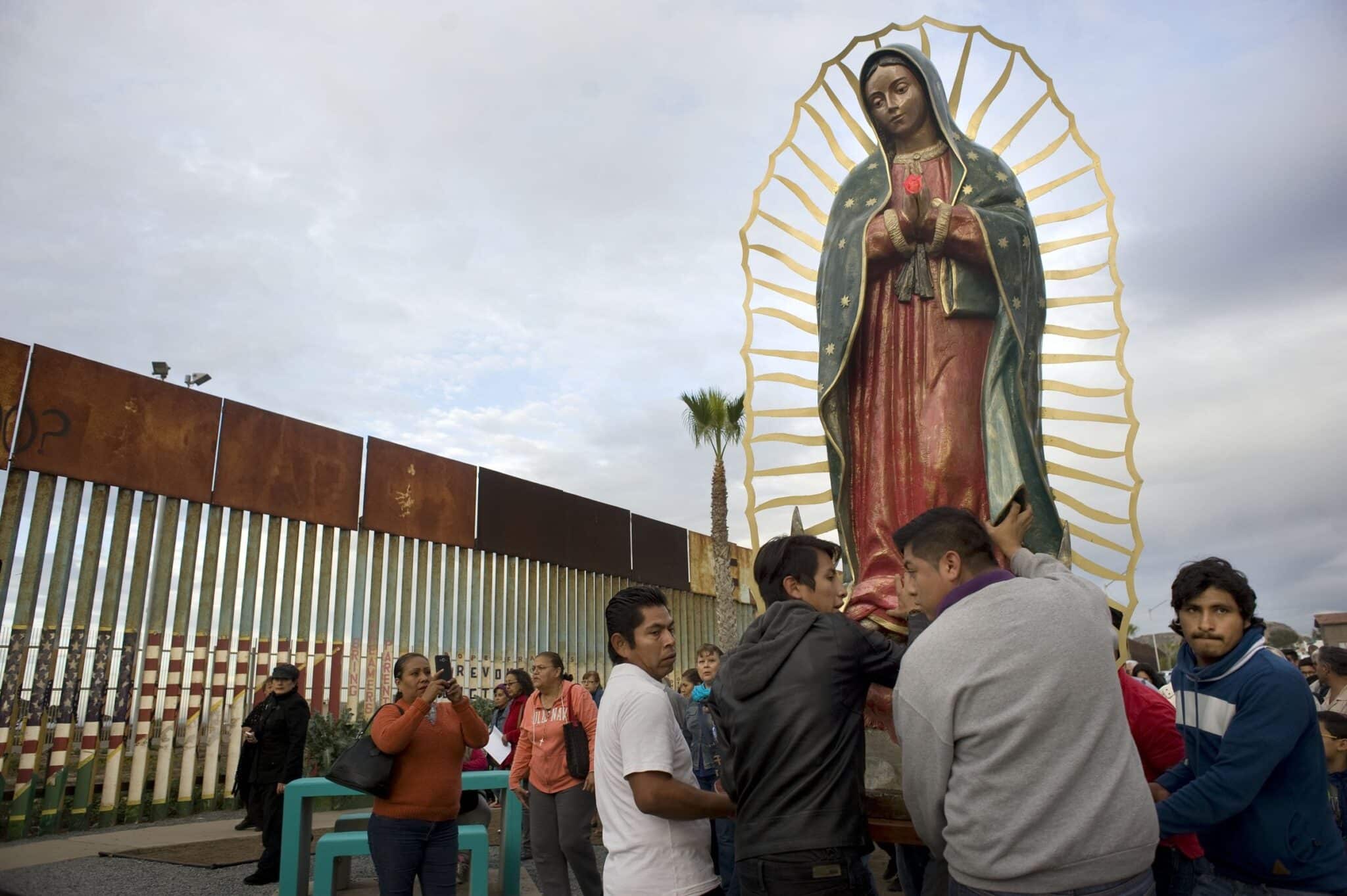NEW YORK (OSV News) — The threat from nuclear weapons is as great now as ever, and their destructive power is more immediate than climate change, said Archbishop John C. Wester of Santa Fe, New Mexico, at a Nov. 29 Mass in Manhattan that remembered Catholic activist Dorothy Day, a candidate for sainthood recognized by the church as a “servant of God.”
Archbishop Wester was visiting New York for the United Nations’ second Meeting of States Parties to the Treaty on the Prohibition of Nuclear Weapons, held from Nov. 27 to Dec. 1 at U.N. headquarters in Manhattan. The visit also came four years to the week of Pope Francis’s visit to Japan, when the pontiff declared that the possession, construction and use of nuclear weapons are all immoral.
The Mass at Church of Our Saviour on Park Ave. also coincided with the 42nd anniversary of Day’s death.
“Our important work on nuclear disarmament requires perseverance — a perseverance that will truly save our lives,” Archbishop Wester stated at the beginning of a long homily following a reading from Daniel 6, best known as the story of Daniel in the lions’ den.
“In 1965, at the height of the Cold War, Dorothy Day denounced the idea of arms being used as deterrents to establish a balance of terror. She supported the Second Vatican Council when it taught that nuclear warfare was incompatible with the then-Catholic theory of ‘just war’,” Archbishop Wester said, recalling Day’s anti-violence and anti-war activism.
“Catholics should establish disarmament as a critical pro-life issue,” Archbishop Wester said, referring to his own Archdiocese of Santa Fe as “the birthplace of nuclear weapons.”
In an interview with The Good Newsroom, the news outlet of the Archdiocese of New York, at a reception following the Mass, Archbishop Wester said that nuclear disarmament remains a timely issue.
“The trouble with this issue is that it’s in the background. We’ve been lulled into a false sense of complacency really since the 1980s. Climate destruction is indeed very important, but this is equally important — in some ways more important — because while climate change is gradual, this would be instantaneous. This would be the destruction of human civilization within about 24 hours,” he said.
In 2022, Archbishop Wester released the pastoral letter “Living in the Light of Christ’s Peace: A Conversation Toward Nuclear Disarmament,” calling for “a serious conversation in New Mexico and across the nation about nuclear disarmament,” since “we can no longer deny or ignore the dangerous predicament we have created for ourselves.”
The Treaty on the Prohibition of Nuclear Weapons — the first legally binding international agreement to prohibit and eventually eliminate nuclear weapons — took effect Jan. 22, 2021. Only 93 countries out of the U.N.’s 193 member states have signed it, and the nine states known to have military nuclear programs have not. They are Russia, the United States, the United Kingdom, France, China, India, Pakistan, Israel and North Korea.
In February, Russian President Vladimir Putin suspended his nation’s participation in the New Strategic Arms Reduction Treaty, and then in November signed a bill revoking Russia’s ratification of the Comprehensive Nuclear Test Ban Treaty.
On Oct. 27, the U.S. Department of Defense unveiled the proposed modern variant development of the B61 nuclear gravity bomb, B61-13, which can be carried by the new intercontinental B-21 Raider stealth bomber. The updated bomb is 25 times more destructive than the original atomic bomb dropped by the U.S. on Hiroshima, Japan, during World War II, and is capable of causing the deaths of 1 million people.
“It’s so easy for a situation to accelerate,” Archbishop Wester said, adding “things could happen intentionally or unintentionally” and that the introduction of artificial intelligence and hypersonic delivery systems have reduced the margin for error.
Along with Archbishop Wester, Archbishop Gabriele Caccia, the Vatican’s permanent observer to the U.N., Msgr. Kevin Sullivan, administrator of the Church of Our Saviour and Passionist Father Salvatore Enzo Del Brocco, concelebrated the Nov. 29 Mass.
Born in Brooklyn Heights, New York, Dorothy Day would later have deep roots on Staten Island, one of New York’s five boroughs. She was received into the Catholic Church there and lived part of her life there.
An adult convert to Catholicism, Day was baptized at Our Lady Help of Christians Church in Tottenville, a neighborhood in the borough of Staten Island that borders New Jersey, in 1927.
Day also began a cooperative farm in Pleasant Plains in 1950, operating it for those in need and Catholic Worker members until 1964, when it was sold. She died in 1980 at 83 and is buried in Resurrection Cemetery, also in Pleasant Plains.
It was in Manhattan where Day met Peter Maurin and started The Catholic Worker newspaper in the depths of the Great Depression, and Mary House, the first Catholic Worker hospitality house, of which there are more than 250 worldwide today.
A candidate for sainthood, Day was given the title “Servant of God” when her cause for canonization was officially opened in 2000.
By Steven Schwankert | OSV News







News & Commentary
Nuclear disarmament a ‘pro-life issue,’ warns archbishop
NEW YORK (OSV News) — The threat from nuclear weapons is as great now as ever, and their destructive power is more immediate than climate change, said Archbishop John C. Wester of Santa Fe, New Mexico, at a Nov. 29 Mass in Manhattan that remembered Catholic activist Dorothy Day, a candidate for sainthood recognized by the church as a “servant of God.”
Archbishop Wester was visiting New York for the United Nations’ second Meeting of States Parties to the Treaty on the Prohibition of Nuclear Weapons, held from Nov. 27 to Dec. 1 at U.N. headquarters in Manhattan. The visit also came four years to the week of Pope Francis’s visit to Japan, when the pontiff declared that the possession, construction and use of nuclear weapons are all immoral.
The Mass at Church of Our Saviour on Park Ave. also coincided with the 42nd anniversary of Day’s death.
“Our important work on nuclear disarmament requires perseverance — a perseverance that will truly save our lives,” Archbishop Wester stated at the beginning of a long homily following a reading from Daniel 6, best known as the story of Daniel in the lions’ den.
“In 1965, at the height of the Cold War, Dorothy Day denounced the idea of arms being used as deterrents to establish a balance of terror. She supported the Second Vatican Council when it taught that nuclear warfare was incompatible with the then-Catholic theory of ‘just war’,” Archbishop Wester said, recalling Day’s anti-violence and anti-war activism.
“Catholics should establish disarmament as a critical pro-life issue,” Archbishop Wester said, referring to his own Archdiocese of Santa Fe as “the birthplace of nuclear weapons.”
In an interview with The Good Newsroom, the news outlet of the Archdiocese of New York, at a reception following the Mass, Archbishop Wester said that nuclear disarmament remains a timely issue.
“The trouble with this issue is that it’s in the background. We’ve been lulled into a false sense of complacency really since the 1980s. Climate destruction is indeed very important, but this is equally important — in some ways more important — because while climate change is gradual, this would be instantaneous. This would be the destruction of human civilization within about 24 hours,” he said.
In 2022, Archbishop Wester released the pastoral letter “Living in the Light of Christ’s Peace: A Conversation Toward Nuclear Disarmament,” calling for “a serious conversation in New Mexico and across the nation about nuclear disarmament,” since “we can no longer deny or ignore the dangerous predicament we have created for ourselves.”
The Treaty on the Prohibition of Nuclear Weapons — the first legally binding international agreement to prohibit and eventually eliminate nuclear weapons — took effect Jan. 22, 2021. Only 93 countries out of the U.N.’s 193 member states have signed it, and the nine states known to have military nuclear programs have not. They are Russia, the United States, the United Kingdom, France, China, India, Pakistan, Israel and North Korea.
In February, Russian President Vladimir Putin suspended his nation’s participation in the New Strategic Arms Reduction Treaty, and then in November signed a bill revoking Russia’s ratification of the Comprehensive Nuclear Test Ban Treaty.
On Oct. 27, the U.S. Department of Defense unveiled the proposed modern variant development of the B61 nuclear gravity bomb, B61-13, which can be carried by the new intercontinental B-21 Raider stealth bomber. The updated bomb is 25 times more destructive than the original atomic bomb dropped by the U.S. on Hiroshima, Japan, during World War II, and is capable of causing the deaths of 1 million people.
“It’s so easy for a situation to accelerate,” Archbishop Wester said, adding “things could happen intentionally or unintentionally” and that the introduction of artificial intelligence and hypersonic delivery systems have reduced the margin for error.
Along with Archbishop Wester, Archbishop Gabriele Caccia, the Vatican’s permanent observer to the U.N., Msgr. Kevin Sullivan, administrator of the Church of Our Saviour and Passionist Father Salvatore Enzo Del Brocco, concelebrated the Nov. 29 Mass.
Born in Brooklyn Heights, New York, Dorothy Day would later have deep roots on Staten Island, one of New York’s five boroughs. She was received into the Catholic Church there and lived part of her life there.
An adult convert to Catholicism, Day was baptized at Our Lady Help of Christians Church in Tottenville, a neighborhood in the borough of Staten Island that borders New Jersey, in 1927.
Day also began a cooperative farm in Pleasant Plains in 1950, operating it for those in need and Catholic Worker members until 1964, when it was sold. She died in 1980 at 83 and is buried in Resurrection Cemetery, also in Pleasant Plains.
It was in Manhattan where Day met Peter Maurin and started The Catholic Worker newspaper in the depths of the Great Depression, and Mary House, the first Catholic Worker hospitality house, of which there are more than 250 worldwide today.
A candidate for sainthood, Day was given the title “Servant of God” when her cause for canonization was officially opened in 2000.
By Steven Schwankert | OSV News